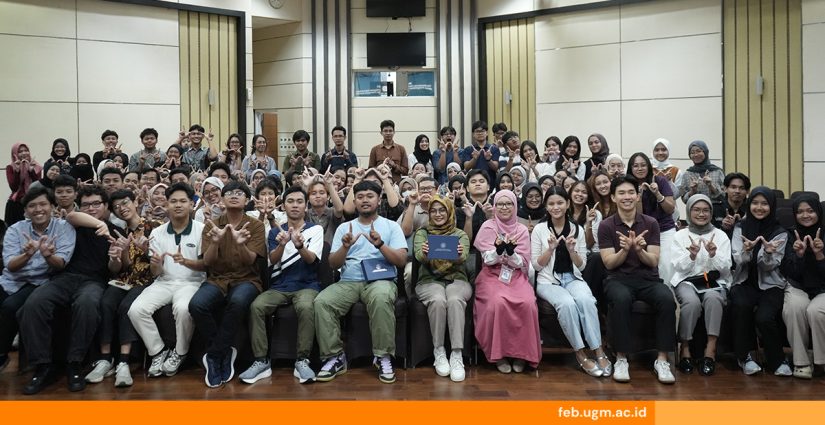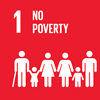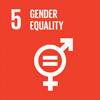
Local innovations rooted in concern for the environment and society have proven capable of creating a global impact. Two inspiring figures—Dwi Martuti Rahayu (Owner of KTW Pawon Gendis) and Fauzan Abdulah Munib, S.Hum (Co-Founder of Daur Resik)—demonstrated that community empowerment not only results in high-quality products but also fosters collective awareness to address environmental and food crises sustainably.
In the first session of the Sharing Sessions Series, organized by the Microeconomics Dashboard Division of the Faculty of Economics and Business at Universitas Gadjah Mada (FEB UGM), both speakers shared real-life stories of how significant change can begin at the local level, with collaboration and commitment as key drivers. The session on Wednesday (28 May 2025) at FEB UGM carried the theme “Community-Based Development: Empowering Communities through Sustainable Waste Management and Cocoa Farming in Banjarharjo Tourism Village.”
In her presentation, Dwi shared the story behind the founding of Wondis Chocolate—a local brand initially innovated by processing pegagan (Centella asiatica) herbs into 47 derivative products.
“In 2013, pegagan was more commonly consumed as a side dish or processed into crackers. I began cultivating and experimenting with various processed forms of this plant,” she explained.
This success encouraged her to develop other products. She then turned her attention to processing local cocoa from Kulon Progo. A year later, she succeeded in producing cocoa infused with pegagan. After going through several development stages, in 2017 the brand Wondis was born—short for Pawon Gendis, the name of the women’s farming group (KWT) that laid the foundation for the brand.
“Wondis aim to support national food resilience and self-sufficiency by promoting sustainable cocoa cultivation and processing. The brand also strives to achieve shared prosperity by empowering the women of Pawon Gendis,” she said.
More than just a chocolate processing business, Wondis has evolved into an integrated movement that includes cocoa farmer mentoring, educational tourism (agro-edutourism), a cocoa-based café, and a children’s learning studio. Dwi added that Wondis focuses on production and maximizing the use of all parts of the cocoa plant to support sustainable agriculture.
The skins of cocoa fruits are used as livestock feed and organic fertiliser, while the shells are turned into natural dyes for batik fabrics, and some of these fabrics have even reached Japan.
Meanwhile, Fauzan Abdulah Munib, S.Hum, Co-Founder of Daur Resik, addressed the challenges of waste management in Indonesia. He explained that industries or landfill sites do not accept 80 percent of waste types because they are non-circular.
“Non-circular waste is rejected by industries and ignored by the state. As a result, it becomes increasingly neglected and less likely to be managed. In fact, CSR (Corporate Social Responsibility) programs should require industries to take full responsibility for the final processing of their products,” Fauzan said.
He explained that conventional waste banks can be a solution. However, they usually require dedicated spaces, structured management, and fixed schedules, making them less practical for busy young families. Daur Resik offers a more flexible alternative, providing services including household waste collection, sorting, and waste management education.
“Using a social entrepreneurship approach, we focus not just on the environment but also on building a sustainable economy,” he added.
He emphasized that Daur Resik is about recycling and building awareness. The organization accepts non-circular waste and transforms it into circular forms, working through the principles of 11Rs, one of which is research.
“We move from the potential of conscious communities, not through coercion. Change can only begin with those who care,” Fauzan concluded.
Through the stories of Dwi Martuti Rahayu and Fauzan Abdulah Munib, participants were encouraged to see how local innovation and collective awareness can serve as real solutions to societal and environmental challenges. The Sharing Sessions Series #1 was not only a space to share inspiration but also a powerful reminder of the importance of collaboration in advancing sustainable development.
Report by: Shofi Hawa Anjani
Editor: Kurnia Ekaptiningrum
Sustainable Development Goals















